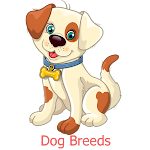
Introduction
The Bullmastiff is a large and powerful breed of dog that is known for its gentle and affectionate nature. They are often referred to as gentle giants and are a popular choice for families and individuals looking for a loyal and protective companion. In this guide, we will explore the history, characteristics, and care needs of the Bullmastiff breed.
History
The Bullmastiff originated in England in the 19th century, where they were bred to protect large estates from poachers. They were created by crossing the powerful Mastiff with the agile and speedy Bulldog, resulting in a breed that was both strong and quick on its feet. The Bullmastiff's original purpose was to track and apprehend poachers without causing them any harm, which required a dog with a keen sense of smell and the ability to move swiftly through rough terrain.
Characteristics
The Bullmastiff is a massive and muscular breed, with a strong and imposing presence. They have a short and dense coat that comes in various shades of fawn, red, or brindle. Their wrinkled forehead and dark mask give them a serious and confident expression. Despite their intimidating appearance, Bullmastiffs are known for their gentle and affectionate nature. They are loyal and devoted to their families, often forming strong bonds with their owners.
Temperament
Bullmastiffs are known for their gentle and docile nature, making them excellent companions for families and individuals of all ages. They are often described as loyal, affectionate, and protective, making them excellent guard dogs. They are also known for their patience and tolerance, especially towards children and other pets. However, their protective instincts can make them wary of strangers, and early socialization is important to ensure they are well-behaved around new people and animals.
Care Needs
As a large and powerful breed, Bullmastiffs require a fair amount of exercise to keep them healthy and happy. Daily walks and playtime in a secure yard are essential to prevent them from becoming bored or destructive. They also benefit from mental stimulation, such as puzzle toys and obedience training, to keep their minds sharp. Their short coat requires minimal grooming, but regular brushing can help to keep their coat healthy and reduce shedding.
Health Considerations
Like all breeds, Bullmastiffs are prone to certain health conditions that potential owners should be aware of. Some common health issues in Bullmastiffs include hip and elbow dysplasia, bloat, and certain heart conditions. Regular vet check-ups, a healthy diet, and regular exercise can help to prevent and manage these health concerns. It's also important to monitor their weight to prevent obesity, which can exacerbate existing health issues.
Conclusion
The Bullmastiff is a gentle giant of a breed, known for its loyalty, affection, and protective instincts. With proper training, socialization, and care, they can make wonderful companions for families and individuals alike. Their gentle and devoted nature, combined with their imposing presence, makes them a popular choice for those looking for a loyal and protective canine companion.
FAQs
Are Bullmastiffs good with children?
Yes, Bullmastiffs are known for their gentle and patient nature, making them great companions for families with children. However, as with any breed, it's important to supervise interactions between dogs and young children to prevent any accidents.
Do Bullmastiffs require a lot of exercise?
Yes, Bullmastiffs are a large and powerful breed that requires daily exercise to keep them happy and healthy. Regular walks and playtime in a secure yard are essential to prevent boredom and destructive behavior.
Are Bullmastiffs aggressive?
Bullmastiffs are not inherently aggressive, but they are protective of their families and can be wary of strangers. Early socialization and training are important to ensure they are well-behaved around new people and animals.
What are the grooming needs of a Bullmastiff?
Bullmastiffs have a short and dense coat that requires minimal grooming. Regular brushing can help to keep their coat healthy and reduce shedding, but they do not require frequent baths or extensive grooming.


